人教版七年级英语全学年时态和句型专项训练
人教版中考英语专项训练动词的时态练习题(含答案)

人教版中考英语专项训练动词的时态练习题(含答案)一、初中英语动词的时态1. My grandma to the radio when I got home just now.A.listensB. listenedC. is listeningD. was listening【答案】D【解析】句意:我刚才到家的时候我的奶奶正在听广播。
结合语境理解可知,当我到家这一时刻,另一个动词正在进行,when引导的时间状语从句是一般过去时,主句表达的是过去正在进行的动作,故句子的时态为过去进行时,答案为皿2 ・—Where's your father; Tom?—He newspaper in the study.A.readsB. readC. is readingD. has read【答案】C【解析】句意:-汤姆,你爸爸在哪里?--他在书房里读报纸。
根据问句"汤姆,你爸爸在哪里?",判断答语的句意是"他正在书房里读报纸。
”即设空处的动作在说话时刻正在进行着,所以句子用现在进行时,现在进行时的构成:am/is/are+动词的现在分词,故答案为C。
3.— Where is Mr. Wu?—He together with his students singing by the lake .A. is practisingB. are practisingC. will practiseD. would practise【答案】A【解析】【详解】句意:一一胡先生在哪里?一一他和他的同学们一起在湖边练习唱歌。
A. is practising正在练习;单数;B. are practising i|;在练习,复数:C. will practise将去练习;—般将来时:D. would practise会去练习,过去将来时。
根据上文Where is Mr. Wu?可知下文用现在进行时,其结构是be doing的形式,主语是he, together with his students在句中做状语;这里be动词用is。
人教版七年级下册英语词汇与句子专项练习(含答案)(1)
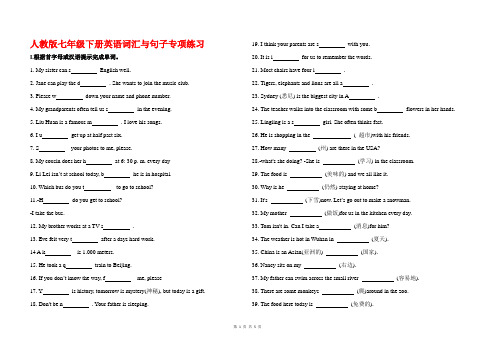
人教版七年级下册英语词汇与句子专项练习I.根据首字母或汉语提示完成单词。
1. My sister can s English well.2. Jane can play the d . She wants to join the music club.3. Please w down your name and phone number.4. My grandparents often tell us s in the evening.5. Liu Huan is a famous m . I love his songs.6. I u get up at half past six.7. S your photos to me, please.8. My cousin does her h at 6: 30 p. m. every day9. Li Lei isn’t at school today, b he is in hospital.10. Which bus do you t to go to school?11.-H do you get to school?-I take the bus.12. My brother works at a TV s .13. Eve felt very t after a days hard work.14 A k is 1.000 meters.15. He took a q train to Beijing.16. If you don’t know the way, f me, please17. Y is history, tomorrow is mystery(神秘), but today is a gift.18. Don't be n . Your father is sleeping. 19. I think your parents are s with you.20. It is i for us to remember the words.21. Most chairs have four l .22. Tigers, elephants and lions are all a .23. Sydney (悉尼) is the biggest city in A .24. The teacher walks into the classroom with some b flowers in her hands.25. Lingling is a s girl. She often thinks fast.26. He is shopping in the ( 超市)with his friends.27. How many (州) are there in the USA?28.-what's she doing? -She is (学习) in the classroom.29. The food is (美味的) and we all like it.30. Why is he (仍然) staying at home?31. It's (下雪)now. Let’s go out to make a snowman.32. My mother (做饭)for us in the kitchen every day.33. Tom isn't in. Can I take a (消息)for him?34. The weather is hot in Wuhan in (夏天).35. China is an Asian(亚洲的) (国家).36. Nancy sits on my (右边).37. My father can swim across the small river (容易地).38. There are some monkeys (爬)around in the zoo.39. The food here today is (免费的).40. People can’t live without(没有) (空气).41. Please (描述) the boy carefully so that(以便) we can find him easily.42. In the (结尾). we finished our work on time.43. I’m a little thin, but my brother is very (重的).44. Cathy has long (直的)hair.45. My father (总是)gets up at six in the morning.46. My father often (驾驶)his car to go to work.47. He can’t cook and he often (点菜) some food to eat in the restaurant.48. There is lots of (雨水)in the south of China in summer.49. The boy looks (英俊的) and we all like him.50. The weather was very (糟糕的).II.根据句意,用所给单词的正确形式填空。
2023-2024学年人教版七年级英语上册期末复习四种时态总结

2023-2024学年人教版七年级英语上册期末四种时态总复习1.疑问词+一般疑问句(去掉提问部分)2.若提问主语,选定疑问词替换主语即可3.疑问词作主语,谓语动词一般用三单4.若连同谓语动词一起提问,疑问词用what ,并借用实意动词do 替代谓语动词部分一般现在时 现在进行时(be doing)一般过去时 一般将来时(be going to do/ will do)肯定句 She is a teacher.She works here. She is working here.She was a teacher.She worked here. I ’m going to practice English every day.Kids will study at home on computers.否定句1.be 动词后直接+not2. 动词前+don ’t/doesn ’t 1.be 动词后直接+not1.be 动词后直接+not2.动词前+didn ’t1.be 动词后直接+not2.will 后直接+not (will not/won ’t ) 一般疑问句 1.be 动词直接提前 2.借助助动词do/does 提前 1.be 动词直接提前 1.be 动词直接提前2.借助助动词did 提前1.be 动词直接提前2.will 直接提前特殊疑问句1.疑问词+一般疑问句(去掉提问部分)2.若提问主语,选定疑问词替换主语即可1.疑问词+一般疑问句(去掉提问部分)2.若提问主语,选定疑问词替换主语即可 1.疑问词+一般疑问句(去掉提问部分) 2.若提问主语,选定疑问词替换主语即可 1.疑问词+一般疑问句(去掉提问部分)2.若提问主语,选定疑问词替换主语即可时间状语频度副词always 、usually 、three times a daynow 、listen 、look 、these daysyesterday 、two days ago 、in 1999、this morning 、just now 、last yearin +一段时间、tomorrow 、the coming year 、next September 、if 条件状语从句/when 时间状语从句动词三单1.一般:-s2. s/x/ch/sh-es (watches/finishes)3. 辅+y :变y 为i-es(tries/worries )现在分词1. 一般:-ing2.去e-ing (using 、making)3.辅元辅,双写-ing(swimming/running)动词过去式 1.一般:-ed 2.e 结尾加-d(lived) 3.辅+y :变y 为i- ed(worry-worried ) 4.辅元辅:双写-ed (stopped 、planned)There be 句型的将来时 1.There is/ going to be … 2.There will be …计划打算:be going to 主将从现:will注意:动词原形四种情形:1.情态动词(can/may/might/have to/must/will/would/should/shall)+动词原形2.祈使句中,用动词原形3.助动词do/don’t/does/doesn’t/did/didn’t 后,用动词原形4.使役动词let/make/have sb. do注意:v-ing的三种情况1.现在进行时be doing2.介词+v-ing3.enjoy/miss/mind/finish/have fun/practice/keep/suggest/avoid/can’t help/consider/feel like/give up doing注意:主将从现主将从现主句一般将来时从句一般现在时will +动原if后引导的是从句动原/三单If it rains tomorrow, we will not go to the zoo.从句(现)主句(将)If he doesn’t come, I will phone/call him.从句(现)主句(将)Eg:肯定句: I’m going to practice basketball every day.否定句:I’m not going to practice basketball every day.一般疑问句:Are you going to practice basketball every day.特殊疑问句:1. 若提问主语,选定疑问词替换掉主语即可Who is going to practice basketball every day? (对I提问)2. 疑问词+一般疑问句(去掉提问部分)What are you going to practice every day? (对basketball提问)How often are you going to practice basketball? (对every day提问)What are you going to do every day? (对practice basketball提问)肯定句:Tom is going to move to Shanghai next year. (习题)否定句:__________________________________________.一般疑问句: ____________________________________________. 特殊疑问句:1. _______________________________________________________.2. _______________________________________________________. 3_______________________________________________________.4.______________________________Eg:肯定句: Robots will think like humans in the future.否定句:Robots won’t think like humans in the future.一般疑问句:Will robots think like humans in the future?.特殊疑问句:1. 若提问主语,选定疑问词替换掉主语即可what will think like humans in the future? (对Robots提问)2. 疑问词+一般疑问句(去掉提问部分)What will robots think like in the future? (对humans提问)When will robots think like humans? (对in the future提问)What will robots do in the future? (对think like humans提问)肯定句: Cities will be more crowded and polluted in 100 years.(习题) 否定句:__________________________________________.一般疑问句: ____________________________________________. 特殊疑问句:1. _______________________________________________________.2. _______________________________________________________. 3_______________________________________________________.Eg:肯定句: Tom visited his grandpa by train last week.否定句:Tom didn’t visit his grandpa by train last week.一般疑问句:Did Tom visit his grandpa by train last week.特殊疑问句:1. 若提问主语,选定疑问词替换掉主语即可Who visited his grandpa by train last week? (对Tom提问)2. 疑问词+一般疑问句(去掉提问部分)Who did Tom visit by train last week? (对his grandpa提问)when did Tom visit his grandpa by train ? (对last week提问)How did Tom visit his grandpa last week? (对by train提问)What did Tom do by train last week? (对visited his grandpa提问)肯定句:Tom went to Beijing with his friends yesterday? (习题)否定句:__________________________________________.一般疑问句: ____________________________________________. 特殊疑问句:1. _______________________________________________________.2. _______________________________________________________. 3_______________________________________________________.4.________________________________________________________.。
七年级英语专项训练
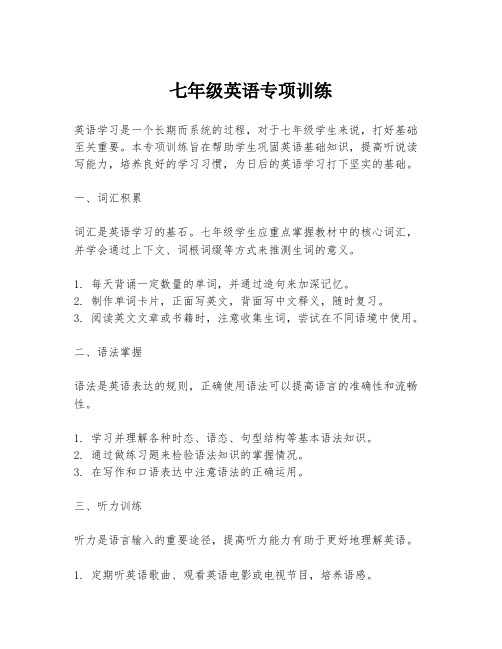
七年级英语专项训练英语学习是一个长期而系统的过程,对于七年级学生来说,打好基础至关重要。
本专项训练旨在帮助学生巩固英语基础知识,提高听说读写能力,培养良好的学习习惯,为日后的英语学习打下坚实的基础。
一、词汇积累词汇是英语学习的基石。
七年级学生应重点掌握教材中的核心词汇,并学会通过上下文、词根词缀等方式来推测生词的意义。
1. 每天背诵一定数量的单词,并通过造句来加深记忆。
2. 制作单词卡片,正面写英文,背面写中文释义,随时复习。
3. 阅读英文文章或书籍时,注意收集生词,尝试在不同语境中使用。
二、语法掌握语法是英语表达的规则,正确使用语法可以提高语言的准确性和流畅性。
1. 学习并理解各种时态、语态、句型结构等基本语法知识。
2. 通过做练习题来检验语法知识的掌握情况。
3. 在写作和口语表达中注意语法的正确运用。
三、听力训练听力是语言输入的重要途径,提高听力能力有助于更好地理解英语。
1. 定期听英语歌曲、观看英语电影或电视节目,培养语感。
2. 利用英语听力教材进行专项训练,注意听力技巧的运用。
3. 参与英语角或与外国朋友交流,提高实际听力水平。
四、口语表达口语是语言输出的重要方式,良好的口语能力有助于提高语言运用的自信。
1. 每天进行英语口语练习,可以是朗读、对话或演讲。
2. 参加英语演讲比赛或辩论赛,锻炼即兴表达能力。
3. 与同学或老师进行英语对话,提高实际交流能力。
五、阅读理解阅读理解是检验语言综合运用能力的重要方式。
1. 阅读不同类型的英文材料,如小说、报纸、杂志等。
2. 学习并运用各种阅读技巧,如略读、寻读、精读等。
3. 完成阅读理解练习题,提高理解速度和准确度。
六、写作能力写作是表达思想和观点的重要手段,良好的写作能力有助于提高英语综合运用能力。
1. 学习并掌握不同类型的写作格式,如记叙文、说明文、议论文等。
2. 定期进行写作练习,注意文章结构和逻辑性。
3. 参加写作比赛或向校刊投稿,提高写作水平和自信心。
人教版英语专项训练 七年级英语完形填空单元练习题(含答案)
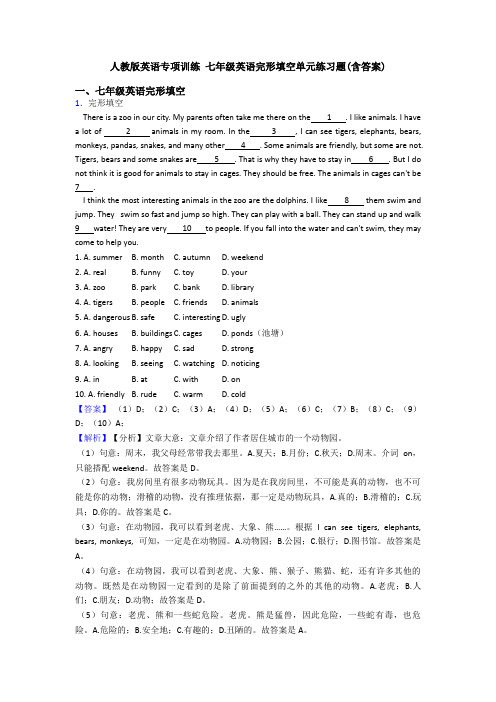
人教版英语专项训练七年级英语完形填空单元练习题(含答案)一、七年级英语完形填空1.完形填空There is a zoo in our city. My parents often take me there on the 1 . I like animals. I havea lot of 2 animals in my room. In the 3 , I can see tigers, elephants, bears, monkeys, pandas, snakes, and many other 4 . Some animals are friendly, but some are not. Tigers, bears and some snakes are 5 . That is why they have to stay in 6 . But I do not think it is good for animals to stay in cages. They should be free. The animals in cages can't be7 .I think the most interesting animals in the zoo are the dolphins. I like 8 them swim and jump. They swim so fast and jump so high. They can play with a ball. They can stand up and walk 9 water! They are very 10 to people. If you fall into the water and can't swim, they may come to help you.1. A. summer B. month C. autumn D. weekend2. A. real B. funny C. toy D. your3. A. zoo B. park C. bank D. library4. A. tigers B. people C. friends D. animals5. A. dangerous B. safe C. interesting D. ugly6. A. houses B. buildings C. cages D. ponds(池塘)7. A. angry B. happy C. sad D. strong8. A. looking B. seeing C. watching D. noticing9. A. in B. at C. with D. on10. A. friendly B. rude C. warm D. cold【答案】(1)D;(2)C;(3)A;(4)D;(5)A;(6)C;(7)B;(8)C;(9)D;(10)A;【解析】【分析】文章大意:文章介绍了作者居住城市的一个动物园。
2020-2021学年人教版英语七年级下册期末一般过去时专项复习及练习题(含答案)

2021年春人教七下一般过去时专项复习与检测一,概述:一般过去时(Simple past tense),其实应该叫,过去一般时。
是初中必考,常考的时态,也是中学生学习的难点。
二,一般过去时表示过去某个时间里发生的动作或状态,常和表示过去的时间状语连用,如:yeterday,last night,in 2000,two days ago 等。
如:He got up at 6:00 yesterday.She was out just now.一般过去时也表示经常或反复发生的动作,常和often,always 等表示频度的时间状语连用。
如:He always worked late at night last year.三,结构:四,关于动词过去式的规则与不规则的构成及发音规则:规则变化:1.2.常见不规则动词过去式:A-A形(原形、过去式同形)改动元音字母型的(改动一个元音字母)A-B型(完全不一样)一般过去时专项练习一,基础训练。
写出下列单词的过去式。
1.look______2.play______3.study_______4.hope_______e______6.arrive______7.cross_______8.listen_______9.watch_______10.fight_____ 11.relax_______12.follow_________13.save________14.shop________15.cook_______16.visit_______17.turn_______18.climb______19.enjoy____ 20.answer_______21.pick______22.stay______23.shout______24.move____ 25.sing_____26.swim______27.tell______28write______29make_______ 30.get_____31.run______32.ride________33.drive_______34.leave_______ 35.wear_______36.bring_______37.go______e______39.read______ 40.feel_______41.keep______42.sleep______43.forget________44.cut_____ 45.drink_______46.sit______47.pay_______48.spend_______49.put_______ 50.blow_______51.feed_______52.grow_______53.hear______54.fly_______ 55.wake________二,根据括号中单词的适当形式填空。
初一全一册英语基础知识专项训练
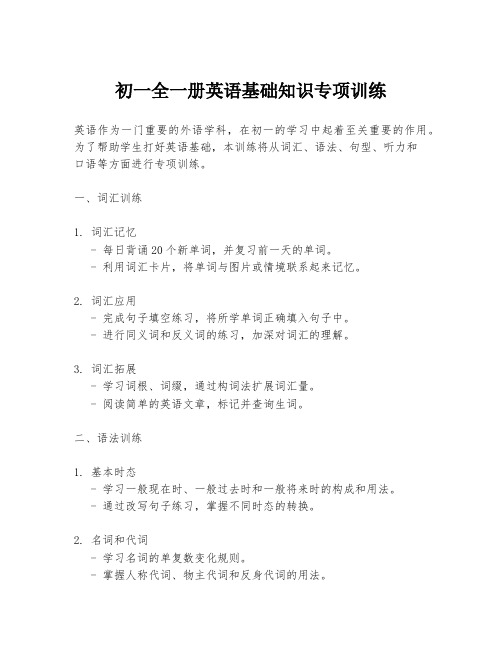
初一全一册英语基础知识专项训练英语作为一门重要的外语学科,在初一的学习中起着至关重要的作用。
为了帮助学生打好英语基础,本训练将从词汇、语法、句型、听力和口语等方面进行专项训练。
一、词汇训练1. 词汇记忆- 每日背诵20个新单词,并复习前一天的单词。
- 利用词汇卡片,将单词与图片或情境联系起来记忆。
2. 词汇应用- 完成句子填空练习,将所学单词正确填入句子中。
- 进行同义词和反义词的练习,加深对词汇的理解。
3. 词汇拓展- 学习词根、词缀,通过构词法扩展词汇量。
- 阅读简单的英语文章,标记并查询生词。
二、语法训练1. 基本时态- 学习一般现在时、一般过去时和一般将来时的构成和用法。
- 通过改写句子练习,掌握不同时态的转换。
2. 名词和代词- 学习名词的单复数变化规则。
- 掌握人称代词、物主代词和反身代词的用法。
3. 形容词和副词- 学习形容词的比较级和最高级形式。
- 理解副词的位置和用法。
4. 句子结构- 练习主语、谓语和宾语的识别与运用。
- 学习简单句、并列句和复合句的构造。
三、句型训练1. 基本句型- 练习“主语+谓语”、“主语+谓语+宾语”等基本句型。
2. 疑问句- 学习一般疑问句和特殊疑问句的构成。
- 练习使用疑问词(who, what, where, when, why等)提问。
3. 否定句- 掌握否定句的构成,如“主语+don't/doesn't+动词原形”。
4. 祈使句- 学习如何用动词原形开头构造祈使句,表达请求或命令。
四、听力训练1. 日常对话- 听录音,理解日常对话的内容和意图。
2. 短文理解- 听短文并回答相关问题,提高对信息的捕捉和理解能力。
3. 听力填空- 听录音,完成句子或段落中的空白部分。
五、口语训练1. 自我介绍- 练习用英语进行自我介绍,包括姓名、年龄、爱好等。
2. 日常交流- 模拟购物、问路、点餐等日常场景,进行对话练习。
3. 话题讨论- 围绕学校生活、兴趣爱好等话题,进行小组讨论。
2024年最新人教版初一英语专项训练
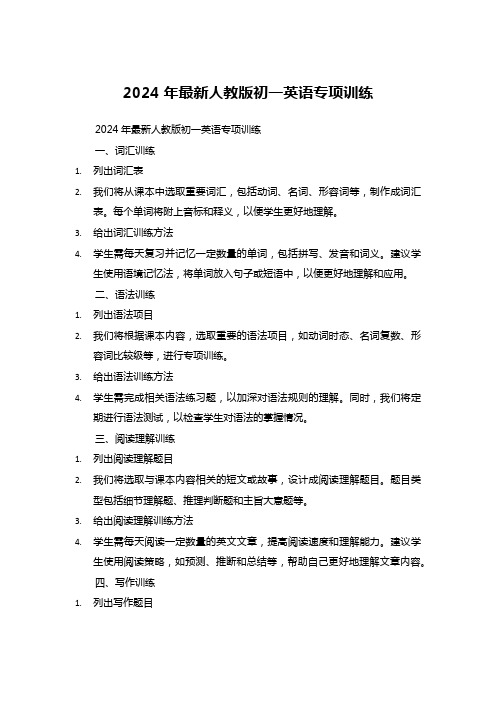
2024年最新人教版初一英语专项训练2024年最新人教版初一英语专项训练一、词汇训练1.列出词汇表2.我们将从课本中选取重要词汇,包括动词、名词、形容词等,制作成词汇表。
每个单词将附上音标和释义,以便学生更好地理解。
3.给出词汇训练方法4.学生需每天复习并记忆一定数量的单词,包括拼写、发音和词义。
建议学生使用语境记忆法,将单词放入句子或短语中,以便更好地理解和应用。
二、语法训练1.列出语法项目2.我们将根据课本内容,选取重要的语法项目,如动词时态、名词复数、形容词比较级等,进行专项训练。
3.给出语法训练方法4.学生需完成相关语法练习题,以加深对语法规则的理解。
同时,我们将定期进行语法测试,以检查学生对语法的掌握情况。
三、阅读理解训练1.列出阅读理解题目2.我们将选取与课本内容相关的短文或故事,设计成阅读理解题目。
题目类型包括细节理解题、推理判断题和主旨大意题等。
3.给出阅读理解训练方法4.学生需每天阅读一定数量的英文文章,提高阅读速度和理解能力。
建议学生使用阅读策略,如预测、推断和总结等,帮助自己更好地理解文章内容。
四、写作训练1.列出写作题目2.我们将根据课本内容,设计不同主题的写作题目,如描述自己的家人、朋友或老师等。
3.给出写作训练方法4.学生需每周完成一篇英文写作练习,加强写作技巧和表达能力。
建议学生先列出写作提纲,再起草文章,最后修改语法和拼写错误。
五、听力训练1.列出听力材料2.我们将选取与课本内容相关的音频材料,如对话、短文或新闻等,作为听力训练素材。
3.给出听力训练方法4.学生需每天听取一定时间的英文音频,提高听力水平。
建议学生使用泛听和精听相结合的方法,逐步提高听力理解能力。
六、口语训练1.列出口语材料2.我们将选取与课本内容相关的口语话题,如问候、介绍自己或他人等。
3.给出口语训练方法4.学生需每天进行一定时间的口语练习,加强口语表达能力和语音语调。
建议学生使用角色扮演、小组讨论和口头报告等方式进行口语训练。
- 1、下载文档前请自行甄别文档内容的完整性,平台不提供额外的编辑、内容补充、找答案等附加服务。
- 2、"仅部分预览"的文档,不可在线预览部分如存在完整性等问题,可反馈申请退款(可完整预览的文档不适用该条件!)。
- 3、如文档侵犯您的权益,请联系客服反馈,我们会尽快为您处理(人工客服工作时间:9:00-18:30)。
七年级英语时态和句型专项训练——Book I & Book Ⅱ英语句子中的动词常发生词形变化,动词变化的原因一般有三个方面:1、受时态的影响;2、受主语的影响(即“主谓一致”原则);3、受固定句型的影响。
谓语动词的变化原因通常是前两项,非谓语动词变化原因是第三项。
完成下列各题判断括号内的动词是谓语动词还是非谓语动词,并写出词形变化的原因,如果原因是第三项,并写出相应的句型。
1. He ________(be) Jack.2. They ________(be) my friends.3. Her last name _________(be) Green.4. Those _________(be) my parents.5. You _________(be) my best friend.6. Here _________(be) two nice photos of my family.7. One of the boys __________(be) from the USA.8. Tom and Jim _________(be) from the UK.9. Tom with Jim __________(be) in the room.10. Last year I _________(be) in Australia.11. Where _________(be) you last Saturday?12. There ________(be) a new movie next Friday evening.13. There ________(be) some books on the desk.14. There _________(be) some milk in the glass.15. There ___________(be) a book and two rulers on the desk.16. There _________(be) two rulers and a book on the desk.17. My sister ________(have) a new bike.18. ________ you ________(have) a baseball?19. ________ he _________(have) a soccer ball?20. She __________(not have) a tennis ball.21. Let him ____________(play) ping-pong ball.22.Let’s _________(go) to school at 7:30.23. Let Jack ________(help) you.24. That ________(sound) good.25 I like __________(dance) very much.26.She likes __________(dance) very much.27 He ________(watch) TV at home every evening.28. They love ________(play) ping-pong ball.29. _______ you __________(like) bananas?30. I ________(not like) hamburgers.31. He ________( not like) vegetables.32. _________ she _______(like) tomatoes?33.He _________(like) _________(eat) ice-cream.34. David asks me about my _________(eat) habits.35. What about _________(listen) to music?36. I don’t want ________(be) fat.37. Jim wants __________(go) to the movies.38. She ________(want) _____________(know) about the news.39. How about ________(make) friends with me?40. There __________(be) a pair of black shoes here.41. When ________(be) your birthday?42. Do you want _________(come) to my birthday party?43. I finish ________(read) a book on Sunday.44 Thank you for ________(tell) me the news.45. They are busy ________(learn) English.46.He often helps me __________(study) English.47.I can help Tom ________(study) Chinese.48.I need _________(buy) a new computer.49. Paul asks me __________(go) to the library with him.50. Jack with us _________(eat) dinner every day.51. Jack and we ________(eat) dinner every day.52. He can ________(speak) a little japanese.53. You’re very good at _________(tell) stories.54.Tom can join the _________(swim) club.55. What club does he want ________( join)?56. We need you ________(help) with sports.57 I don’t like _________(get) up early.58. It’s not good for us ________(eat) junk food.59. I will learn ______(play) the piano next year.60. How long does it take you _______(get) to school?61. It’s easy for most students _______(get) to school.62. It’s Jim’s dream _______( have) his own computer.63. ____________(not arrive) late for class.64. He ________(have) to wear a uniform at school.65. She must __________(do) her homework on time.66. One of the boys ________(come) from Wuhan.67.This helps him ________(learn) English better.68. Remember ________(send) me a card.69. Look! Jenny ________(talk) on the phone.70.Mary with Jenny ____________(watch) TV now.71. I would like _________(go) to the movies.72. Would you love _________(watch) TV now?73. Listen! Who ___________(sing) over there?74. Mr Greens __________(eat) dinner at 7:30 P.m.75. He wishes _______(go) to Peking University one day.76. I hope _________(meet) you tomorrow night.77. Can you tell him _________(call) me back?78. We had a great time ________(visit) the museum last week.79. I’m so happy ________(see) them again.80. I love to watch the monkeys _______(climb) the trees.81. ________(get) to the park, you just have to cross Center Street.82. _______(eat) junk food too much is bad for your health.83. It’s bad for your health _______(eat) junk food too much.84. My favorite sport is ________(play) ping-pong ball.85. Her hobby is ________(speak) English.86. I spent much time _______( learn) English.87. My teather made me ________ (stand) outside for a long time yesterday afternoon.88. Do you enjoy ________(listen) to music?89. It’s relaxing _________(spend) weekends like this.90. He forgot _________(bring) his homework to school.91. Let me _________ (tell) you what he looks like.92. He’d like ________(eat) some noodles.93. What would you like _________(drink)?94. We ______(take) some photos last week.95. He ___________(go) fishing last summer vacation.96. Peter _______(not visit) a museum last winter vacation.97. I ________(tell) the visitors about my _________(live) habits. But they saidnothing.98. Who _____________(visit) the farm last weekend?99. Did you practice ____________(speak) English yesterday?100. I kept _________(speak) English all the time.101. Are you afraid ____________(watch) scrary movies?102. Stop _______(talk) ! My father is sleeping.103. I was very tired. So I stopped ______(relax)104. This is a good place _______(relax).105. He tried his best ________(study) schoowork.。
